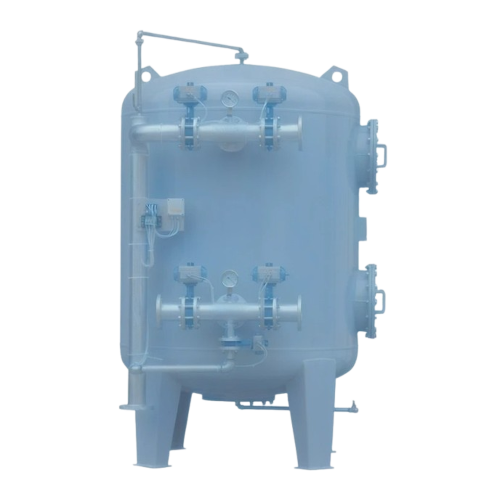INDUSTRIAL FILTER
An Industrial Filter is an essential component in many industries where It serves to remove contaminants, particles, and impurities from air, water, liquids, gases, and other materials.
They ensure operational efficiency, maintain safety standards, and protect equipment from wear or damage.
Key features of Filters
-
Filtration Efficiency: are designed to remove a wide range of particle sizes, from large debris to microscopic particles. The efficiency is often defined by its micron rating. They can be rated by their ability to capture contaminants (e.g., 95%, 99%, or higher), ensuring minimal contamination in the filtered product or medium.
-
Flow Rate: they must handle large volumes of fluids/gases w/o compromising performance. The flow rate indicates how much fluid it can be processed per unit of time (L/min or GPM). Designed to ensure that high volumes of material can pass through w/o clogging or losing efficiency. Pressure difference between the inlet/outlet should be minimized to prevent system inefficiency. They are designed to balance a high flow rate w/minimal pressure drop.
-
Durability & Material Construction: built from durable materials withstanding harsh environments – high temperatures, corrosive chemicals, and high pressure. Common materials: stainless steel, carbon steel, synthetic fabrics, ceramics, carbon, and plastics. Used in harsh environments (e.g., chemical processing, oil & gas, or marine applications) often have coatings made from materials resistant to corrosion: as stainless st. or plastic composites.
-
Type of Filtration Mechanism: they physically trap particles based on size (e.g., mesh or screen filters). Typically used for larger particles or debris. Activated carbon or charcoal filters capture gases, chemicals, or odors by absorbing or adsorbing them onto the surface of the material. Some allow contaminants to be captured throughout the material (e.g., depth filters or pleated filters). Such filters have more surface area & trap larger amounts of particles. Others capture contaminants primarily on the surface of the material (e.g., membrane filters, screens).
-
Filter Media: can use a range of filter media: fiberglass, woven fabrics, ceramic materials, membranes, & sintered metal. Media choice affects filtration efficiency, chemical resistance, and temperature tolerance. Can be designed w/multiple layers, serving a specific function (e.g., a coarse pre-filter layer followed by a fine filtration layer).
-
Cleaning & Maintenance: some industrial filters – cartridge filters or bag filters, are designed to be cleaned & reused, this reduces replacement costs and waste. Can be washable or backflushed (reverse flow cleaning). They have easy maintenance/replacement. Many have a bypass valve to allow uninterrupted operation while the filter is being cleaned or replaced. Some (e.g., automatic backwash filters) are equipped w/self-cleaning systems, which automatically clean the filter media when they become clogged or when a certain pressure differential is reached.
-
Temperature & Pressure Tolerance: many industrial processes involve extreme temperatures, so filters are built to withstand high heat (e.g., in gas turbines, furnaces, and petrochemical processes).
-
Size & customization: various sizes, from small inline filters for plumbing and HVAC systems to large, industrial scale used in power plants, chemical processing, and oil & gas operations. They can be customized based on the application’s specific requirements (e.g., particle size, pressure, flow rate), w/bespoke designs that meet unique operational conditions.
-
Automation & Monitoring: part of automated systems that continuously monitor performance. Sensors may detect when the it’s clogged or when maintenance is needed, triggering alarms or automatic cleaning. Or equipped w/pressure gauges or flow meters that help monitor the filter’s performance & ensure it is functioning efficiently.
-
Environmental & Regulatory Compliance: designed to meet specific industry STD & environmental regulations (e.g., ISO, EPA, OSHA) for air quality, water purity, and waste management. Designed for environmentally conscious applications-built w/eco-friendly materials, designed for easy recycling, or have long lifespans to minimize waste and reduce environmental impact.
-
Cost Effectiveness: designed to provide high filtration performance while keeping operating costs low – energy consumption or regular maintenance. High-quality industrial filters are built to last and require less frequent replacement, contributing to overall cost savings for industries.
-
Safety & Risk Mitigation: protect critical equipment – pumps, engines, turbines, and reactors by preventing the ingress of contaminants that could cause damage or reduce efficiency. Crucial for maintaining worker safety in environments w/exposure to hazardous materials, ensuring air and water are clean and free from toxic particles.
Available Stock
We have in stock Threaded Y-strainers
Materials: Cast Iron, Brass, Bronze, Stainless Steel
Type: THRD and Flanged
Pressure: PN10 to PN64
Sizes: from DN15 to DN300
Materials: Carbon and stainless steel
Type: SW and Flanged
Pressure: PN10, PN40 and PN64
ANSI: #150 – #300 – #600 – #800 – #1500 – #2500
Sizes: from ½” to 8″





Common Applications
-
Air Filtration
-
Water & Wastewater Treatment
-
Chemical Processing
-
Petrochemical Industry
-
Oil & Gas Industry
-
Automotive Industry
-
Power Generation
-
Pharmaceutical & Biotechnology
-
Textile Industry
-
Electronics
-
Semiconductors Manufacturing
-
Food & Beverage Industry
Types of Filters
-
Bag Filters
-
Inline Filters
-
Sand Filters
-
Basket Filters
-
Coalescing Filters
-
Oil Filters
-
Y-Strainer Filters
Information Request
Enter your details in the form below to request information on our products and services.
"*" indica i campi obbligatori
